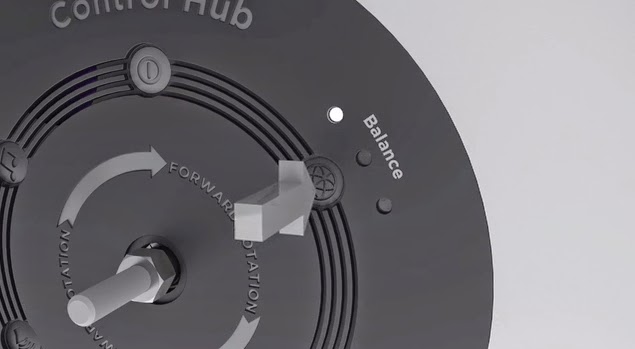It also has other potential applications, because even cyclists who are more skilled than triathletes, such as toddlers, will likely benefit from it as well.
As a cyclist and owner of a human child I was intrigued by this product, which is the most ambitious childhood bicycle learning tool since that remote-controlled brake thing:
I live in a pretty hilly neighborhood and I wouldn't have minded having a MiniBrake the time my human child lost control of his bike on a steep street, hit the curb perpendicularly, and went over the bars. Then again, after a good cry he asked if he could do it again, so maybe physics is the best teacher.
However, the Jyrobike is different. Whereas the MiniBrake is arguably similar to keeping your kid on a leash (which plenty of parents do), the Jyrobike is more of an invisible disembodied hand magically keeping the bicycle upright until your little Fred-in-training learns how to do it himself. (Or your little Frederica-in-training, obviously.) Sure, the Jyrobike spares your precious offspring the essential experience of falling (as well as the subsequent humiliation of trying to extract himself or herself from the frame of the bicycle, also essential), but at least the device is not random and punitive in the Old Testament sense like the MiniBrake is. Instead, the Jyrobike seems to involve your little Fredlet in the process of learning to control the bike. Basically, it's more New Testament, kind of like riding alongside an omniscient and benevolent Psychedelic Disco Jesus.
Anyway, let's take a closer look at the video. Here's someone covered in sensors:
Ironically all these electronics have nothing to do with the development of the Jyrobike itself. This is just one of the lab assistants arriving at work. Between Strava, GPS, keyless bike locks, video cameras to mind the homicidal drivers for you, and all the rest of it, this is what all bike commuters will look like by 2020.
Here's someone else studying something called "lateral perturbation force:"
I am laterally perturbing and vertically vexing, so I'm tempted to change my own name to "Lateral Perturbation Force." It's also a nice complement to my cat's gaming name, which is "Retarding Force:"
Remote control brakes? Self-balancing bicycles? Video games for cats?!? The world's gone screwy, I tell you! SCREWY!!!
Here is what I assume to be a set of really sweet artisanal shifters:
And here's my most favoritest part of the video, when they guy walks alongside the preternaturally upright Jyrobike, slapping it like it's a constipated dog:
("Take a dump already, wouldja? It's freezing out!")
Amazing.
Also, the Jyrobike allows you to determine how much balance assistance the flywheel will provide:
There are three settings: Low, Medium, and Somerville:
There's also a volume control:
I don't know what volume it actually controls, but if they've also invented a remote that controls the volume of a child then they're going to raise at least $30 million in the next six minutes.
Still, as intriguing as it is, an adult Fred such as myself would never, ever employ such a device, for it would be a source of great shame if one of my seventeen (17) children were to learn how to pilot a bicycle any other way than at mine hand and under mine own tutelage in an analog fashion. That's why I'd also never employ a bicycle tutor (via Klaus at Cycling Inquisition again):
Ah, that first bike ride, a time-honored rite of passage for kids and parents alike. The wheezing gasps as Dad or Mom runs alongside, holding up the frame. The secretive release, the momentary independence — the topple, the skinned knees, the tears.
There’s got to be a better way.
Enter the bike tutor, one of an underground army of instructors working to get kids — and adults who never learned as children — riding.
Their going rate is $90 to $125 an hour for private lessons, although some set up higher fees for open-ended sessions or offer lower rates for group instruction.
This seems about right. Anecdotally I'd say children are learning to ride later and later, as the average age of the kids I see on Magnas with training wheels these days is about 17. Moreover, if a kid in the playground so much as eyeballs something with wheels a parent will materialize screaming, "DON'T TOUCH IT WITHOUT A HELMENT!!!" You can't blame parents entirely for any of this, since increasing car traffic over the years has made it nearly impossible to play in the streets, but the upshot is that more and more of them seem to be saying, "Fuck it, I'll wait until he's older and lease him a Hyundai." My guess is that the next generation of suburban children won't learn to ride bikes growing up at all, and will only do so after college when they move to Brooklyn, at which point they will take exorbitantly expensive artisanal cycling lessons so they can be in compliance with the city's strict bicycle licensing requirements and not interfere with driverless car traffic.
In the meantime, I understand Rapha is also getting into the children's bicycle training tool market, and they've already introduced a pair of glasses that will shock your tot if he or she places them under the helment straps:
(Unwitting child smiling in the moment before electrocution.)
Epic.Lastly, here is a video that has been making the rounds recently in which people can't return their Citi Bikes:
Expect a new fleet of self-balancing Citi Bikes by 2025.





















